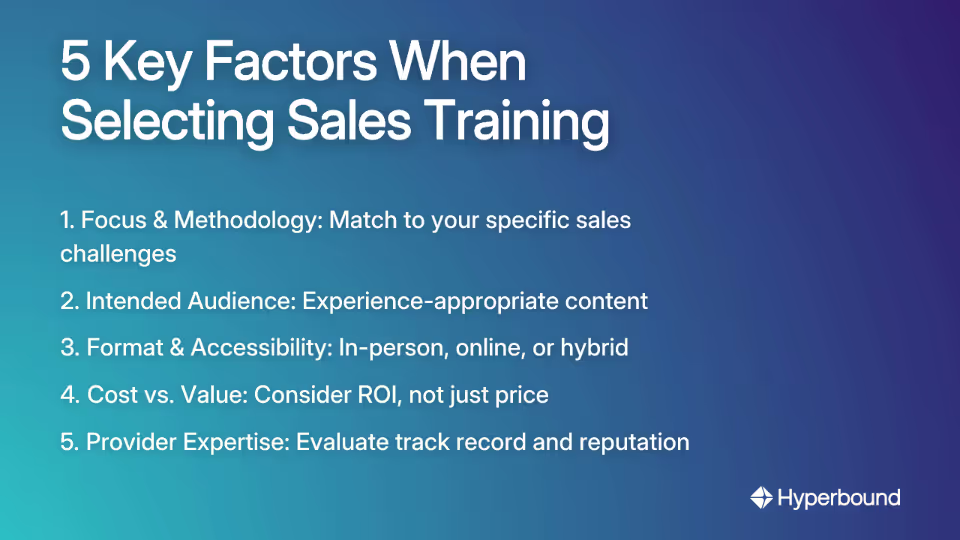
Are you drowning in an ocean of sales books, YouTube videos, and conflicting advice? You're not alone. Many aspiring and current salespeople struggle to find a clear learning path, frustrated by the lack of structure and the fear of investing in programs that, as one professional put it, are "scams or charge way too much for their worth."
The good news? The right training program can dramatically accelerate your sales career and help you stop struggling. In fact, organizations that implement formal salesperson training see a 19% improvement in sales performance and an average ROI of 353%.
This guide cuts through the noise to bring you the top 10 salesperson training programs for 2025, helping you make an informed choice that aligns with your specific goals, experience level, and budget.
Why Investing in Sales Training is a Non-Negotiable in 2025
Sales training isn't merely about teaching closing techniques. It's a comprehensive approach to equipping teams with the skills, knowledge, and methodologies needed to excel in today's competitive landscape. This includes communication, relationship-building, negotiation, product knowledge, and understanding buyer psychology.
The data supporting investment in salesperson training is compelling:
- Enhanced Performance: Companies with continuous training see 50% higher net sales per sales rep. Why? Because well-trained salespeople have the confidence to handle objections and navigate complex sales cycles.
- Competitive Edge: Organizations that invest in sales training are 57% more effective than their competitors. This advantage is crucial for preventing opportunities from "just dying" when prospects ghost you.
- Employee Retention: Investing in your team's development fosters loyalty and reduces costly turnover. It demonstrates your commitment to their long-term success.
- Customer Experience: A staggering 77% of customers make purchasing decisions based on the quality of service they receive. Great training directly impacts this crucial factor.

How to Choose the Right Sales Training Program
Finding the perfect program isn't one-size-fits-all. Here's a framework to help you make the best choice:

1. Focus & Methodology
What specific skills do you need to build? Is it cold calling, negotiation, or strategic account management? Look for programs that teach proven methodologies. Some focus on consultative approaches like SPIN Selling, others on disruptive models like the Challenger Sale.
For B2B sales especially, does the program teach a qualification framework? One sales professional noted their company adopted MEDDIC to systematize how they qualify opportunities, highlighting the need for a clear procedure.
2. Intended Audience
Is the program designed for a new SDR/BDR or a seasoned account executive? Training should be tailored to the experience level of the participants to maximize effectiveness.
3. Format and Accessibility
- In-person: Immersive, great for role-playing and team building
- Online/E-learning: Flexible and cost-effective, learn at your own pace
- Blended/Hybrid: Combines flexibility with immersive workshops
4. Cost vs. Value
Prices range from a few hundred dollars to tens of thousands. Don't just look at the price tag—consider the potential ROI. A $2,000 program that helps you close one extra deal could pay for itself many times over.
5. Provider Expertise & Reputation
Look for providers with a proven track record and positive reviews. Who are their clients? Do they offer certifications?
Be wary of programs whose own salespeople can't sell effectively. As one frustrated buyer noted, "If a member of my sales team failed to respond to TWO messages from a seemingly interested prospect, I'd fire them." The training provider's own sales process speaks volumes about their methods.
The Top 10 Salesperson Training Programs for 2025
1. Sandler Training
- Best For: Creating a systematic, repeatable sales process
- Key Focus: The Sandler Selling System emphasizes upfront contracts, reversing the buyer/seller dynamic, and qualification. It teaches a non-traditional approach that helps salespeople maintain control of the process—perfect for those who need to be "procedural. Being friendly, but robotic."
- Format: In-person and virtual options
- Cost: ~$1,000 - $3,000
- Source: Sandler Sales Training
2. Dale Carnegie Sales Training
- Best For: Building strong interpersonal skills and customer relationships
- Key Focus: Relationship-building, presentation skills, and confidence. Excellent for learning the soft skills that prevent you from being ghosted and build the trust needed to close deals.
- Format: In-person and online courses
- Cost: $1,000 - $5,000
- Source: Dale Carnegie Sales Training
3. Challenger
- Best For: B2B sales teams in complex, competitive markets
- Key Focus: The Challenger Sale methodology—teaching, tailoring, and taking control of the customer conversation. This approach challenges a customer's assumptions to bring new value.
- Format: Self-paced and instructor-led options
- Cost: Contact for pricing
- Source: Challenger
4. RAIN Group
- Best For: Mastering consultative and insight selling with buyer value at the center
- Key Focus: Research-backed, customizable programs teach sellers how to engage with buyers across the sales cycle. Programs include prospecting, consultative selling, sales coaching, negotiation, and more.
- Format: Online, on-site, blended
- Cost: Contact for pricing
- Source: RAIN Group Sales Training
5. Corporate Visions
- Best For: Developing science-backed messaging and negotiation skills
- Key Focus: Using decision science and psychology to create value, differentiate your offerings, and improve negotiation outcomes. Teaches how to build a powerful value proposition.
- Format: Online and onsite training
- Cost: Varies by program
- Source: Corporate Visions
6. ASLAN Training and Development
- Best For: Teams wanting to adopt a customer-centric, "Other-Centered®" approach
- Key Focus: Dropping the pitch to serve the customer, building receptivity, and tailoring solutions. Helps sales reps who struggle to get responses from prospects.
- Format: Online, on-site, blended
- Cost: $200 - $2,500 per participant
- Source: ASLAN Training
7. Richard Harris Consulting (The Harris Consulting Group)
- Best For: Sales leaders and teams needing to improve qualification and process
- Key Focus: N.E.A.T. Selling™, an evolution of older frameworks, focused on modern qualification and forecasting. Excellent for instilling a repeatable process.
- Format: Onsite and online options
- Cost: Contact for pricing
- Source: The Harris Consulting Group
8. Salesforce Sales Representative Certification
- Best For: Individuals looking for a widely recognized, entry-level certification
- Key Focus: Core sales skills from a customer-centric perspective, within the Salesforce ecosystem. The training itself is free on Trailhead, making it highly accessible.
- Format: Online learning with a proctored exam
- Cost: $200 for the certification exam
- Source: Salesforce CRM Platform
9. The Brooks Group: IMPACT Sales Training
- Best For: B2B sales teams seeking a comprehensive and customizable training solution
- Key Focus: B2B selling, negotiations, and sales coaching. Their IMPACT methodology is a six-step process designed to be straightforward and effective.
- Format: Customizable e-learning and workshops
- Cost: Contact for pricing
- Source: The Brooks Group
10. Integrity Selling
- Best For: Developing both the skills (sales role execution) and the mindset (activity and attitude) for success
- Key Focus: A trust-based selling process that focuses on values, ethics, and building genuine customer relationships. Teaches how to let go of the outcome and focus on the process.
- Format: Various formats available
- Cost: Contact for pricing
- Source: Integrity Selling
A Note on Real-World Experience
It's worth addressing a sentiment echoed by many seasoned sales professionals: "The only training that was worth a damn was actually doing the job and falling on my face."
This perspective holds truth. There is absolutely no substitute for real-world application. The lessons learned from rejection, failed pitches, and lost deals create neural pathways that no classroom can replicate.
However, formal training serves as a powerful accelerator to this natural learning process. Think of it as the difference between learning to swim by being thrown into the deep end versus receiving proper instruction before entering the water. Both approaches will eventually teach you to swim, but the latter is more efficient and less painful.
Good salesperson training provides the frameworks, techniques, and mindset to:
- Learn from failures more quickly
- Rebound better after losing a sale
- Turn setbacks into valuable lessons rather than just losses
- Establish a procedure to analyze what went wrong and improve for the next call
The best programs combine theoretical knowledge with practical application, creating a feedback loop that accelerates improvement. This is where AI coaching platforms like Hyperbound come in, allowing reps to practice what they learn in realistic roleplays and get instant feedback on real calls, effectively bridging the gap between training theory and real-world execution.
Conclusion: Making Your Investment Count
Navigating the world of sales training can feel overwhelming, but choosing the right program is one of the most strategic investments you can make in your career or for your team.
The benefits are clear and compelling:
- A 19% improvement in performance
- A 353% average ROI
- A significant competitive advantage in an increasingly challenging marketplace
Whether you're looking to master a systematic process with Sandler, build powerful relationships with Dale Carnegie, or challenge customer thinking with Challenger, there's a program designed to address your specific needs and help you overcome common sales challenges.
Use this guide to evaluate your options, speed up your learning curve, and start building the skills that will define your success in 2025 and beyond. Remember that the right training isn't an expense—it's an investment with measurable returns that will pay dividends throughout your sales career.
The most successful salespeople combine structured training with real-world experience, creating a powerful formula for sustained success. Which of these training salesperson programs will you choose to elevate your skills and results in 2025?
Frequently Asked Questions
Why is sales training important?
Sales training is important because it directly improves sales performance, gives companies a competitive edge, and enhances the customer experience. Organizations with formal training see a 19% improvement in performance and a 353% average ROI. It equips salespeople with the structured methodologies, communication skills, and confidence needed to navigate complex sales cycles, handle objections, and build lasting customer relationships, ultimately leading to higher net sales and better employee retention.
What is the best sales training program for beginners?
For beginners, the best sales training program often focuses on foundational skills and building confidence. Programs like Dale Carnegie are excellent for developing core interpersonal and relationship-building skills. The Salesforce Sales Representative Certification is another great starting point, as its core training is free on Trailhead and provides a widely recognized, entry-level credential focused on customer-centric sales processes.
How much does a good sales training program cost?
A good sales training program can cost anywhere from a few hundred to several thousand dollars. For example, online access to a program like RAIN Group starts around $199/month, while comprehensive programs from providers like Sandler or Dale Carnegie can range from $1,000 to $5,000. It's crucial to evaluate the cost against the potential return on investment (ROI), as a program that helps you close even one additional deal can easily pay for itself.
Can you learn sales without a formal training program?
Yes, you can learn sales through real-world experience, and many successful salespeople learn by "falling on their face." However, formal training acts as a powerful accelerator. It provides proven frameworks and techniques that help you learn from mistakes more quickly, understand what went wrong, and rebound faster. Combining structured training with on-the-job experience is the most efficient and effective path to long-term success.
What is a sales methodology and why does it matter?
A sales methodology is a systematic, repeatable framework that guides how a salesperson approaches each stage of the sales process. It matters because it provides a clear procedure for qualifying leads, handling conversations, and closing deals. Methodologies like the Challenger Sale, Sandler Selling System, or N.E.A.T. Selling™ give sales teams a common language and process, leading to more consistent and predictable results.
How can I apply what I learn in a sales training program?
The best way to apply what you learn is through consistent practice and real-world application. Immediately use the new techniques on calls and in meetings. Role-playing is also a powerful tool for building confidence and mastering new skills without risking live deals. Modern AI coaching platforms like Hyperbound can bridge the gap between training and execution by providing unlimited practice roleplays and instant feedback on real sales calls, helping you implement your learnings effectively.

Book a demo with Hyperbound
.png)













